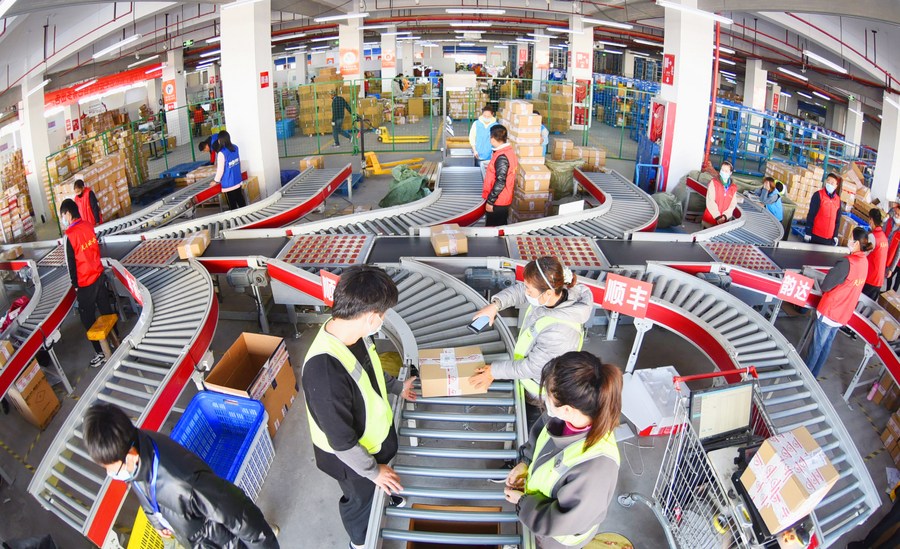Traffic market, data tech will spur innovation, digital biz


Currently, governments around the world have been strengthening their supervision over the platform economy. Their regulatory attitudes toward the platform economy have also been evolving. One main reason is that in the digital era, the role of the platform economy is becoming more and more important.
The term platform economy refers to online marketplaces and other similar operations or businesses based on computer systems that allow consumers, entrepreneurs, businesses and the general public to connect, share resources or sell products or services.
In the digital age, cyberspace was created thanks to the internet and digital technologies, where people carry out economic, social and even political activities. Such a space has also expanded human activity to a fifth platform, if you will, in addition to land, sea, sky and air-a new concept called a "metaverse".
The metaverse describes a fusion between the physical world and the digital world. The platforms play a critical role in such a fusion.
It is also in this sense that the European Union called the platform economy a "gatekeeper". A newly introduced bill in the United States also gives the platform economy a dominant role.
Platforms have played an increasingly important role in all aspects of people's lives, not only in economic and political processes, but also in consumption and social interaction in people's daily lives.
Moreover, the massive amount of data and intelligent algorithms mastered by various platforms can produce exceptionally powerful control and influence on specific individuals, companies and events. Therefore, the EU and the US have both introduced a series of bills to strengthen supervision over the platform economy.
China is no exception. This year is also known as a key year for regulations on the platform economy. The country has been introducing a series of antitrust policies to supervise platforms, including preventing the disorderly expansion of capital and personal data protection.
In February this year, the antimonopoly commission of the State Council, China's Cabinet, launched a guideline for antitrust in the field of the platform economy and put forward clear regulatory requirements on platform-based companies regarding areas including monopoly agreements, abuse of market dominance, concentration of operators and abuse of administrative power to exclude and restrict competition.
In June, a law on data security was unveiled and in August, another law on personal information protection was reviewed and approved. We can see that there is basically a global trend of strengthening economic supervision over platforms, which actually reflects the increasingly important role of platforms in life.
But for the platform economy, the essence is the interconnection between platforms, which has an intimate relationship with traffic and data volume. Traffic and data are also a battlefield for various platforms to compete upon.
Traffic and data in China now include user behavior data, browsing data and online search histories as well as sensitive personal information such as residential locations, mobile phone signals and company locations. Such traffic data contain plenty of commercial value, and the interconnection between platforms will actually affect the configuration of traffic.
With the construction and development of the mobile internet, the country has become one of large traffic resources. The popularization of telecommunications infrastructure and upgrading of communications technologies have helped the formation of the mobile internet and brought huge user traffic to consumer internet platforms. In this way, the value of the platform economy has begun to become prominent.
However, the increase of users has become saturated after the rapid development of the mobile internet in recent years. According to a report on the development of the internet in China released in September last year, as of June this year, the number of internet users in the country reached 1.011 billion and the internet penetration rate reached 71.6 percent.
The number of mobile phone internet users reached 1.007 billion while the average online time per capita was 26.9 hours per week. This means that such metrics may reached their limit in China.
Also, the distribution of traffic resources is uneven. A large number of users are gathered on only a select few platform companies. For example, data disclosed on Baidu's official website showed that in 2019, the number of Baidu users exceeded 1 billion, and the daily active users of the Baidu app reached 200 million, which ranked first in China in terms of information flow.
According to a report by WeChat, as of the first quarter last year, the combined monthly active accounts of WeChat reached 1.2025 billion globally. ByteDance data also showed that Douyin had 400 million daily active users as of January this year.
The advantage of data is that they are highly complementary in value and can play a greater synergistic value. But in China, platforms leverage their own data and traffic to expand capital in a disorderly fashion.
The reason why smaller companies are willing to accept investment from Tencent Holdings and Alibaba is largely not because of their capital but because of their industrial advantages, especially their huge traffic volume.
Currently, platforms only want such traffic types in their own hands. Therefore, the platforms will block each other and reduce links between providers.
According to the Ministry of Industry and Information Technology, in July, the ministry launched a six-month special rectification for the internet industry, asking those companies to remove block link functionality.
If the exchange of traffic between platforms is allowed, merchants on a certain platform can import external traffic from other platforms. Due to the complementary nature of traffic data, this external traffic will be converted into public domain traffic of the platform in larger proportions.
The public domain traffic of the platform can bring greater benefits to other merchants through the traffic distribution mechanism. Since traffic is valuable and has complementary advantages, the more it flows, the more value it creates.
Instead of focusing on the interconnectivity between platforms, we should further consider how to regulate the traffic market. To drive such a market, it is important to build a sound traffic settlement system and allow market mechanisms to play a key role in the configuration of the data and traffic markets.
Some people may question why if data and traffic can be transferred, how can companies protect the security of personal information? When encountering the problem of personal information leakage, should givers or receivers of the data in question bear responsibility?
To solve the problem, more efforts should be made to strike a good balance between personal information protection and interconnectivity between platforms. Companies are being encouraged to further develop data encryption technology so that the data are "available but not visible".
It will also promote the further development and use of data technologies in these related fields, which can better drive data technologies required by artificial intelligence and the industrial internet.
A standardized traffic market will not only protect personal information, privacy and corporate business secrets, but also promote technological innovations and better create a digital economy ecosystem so as to further drive the healthy development of the digital economy.
The writer is deputy director of the Institute of Economics of Tsinghua University.
The views don't necessarily reflect those of China Daily.




































